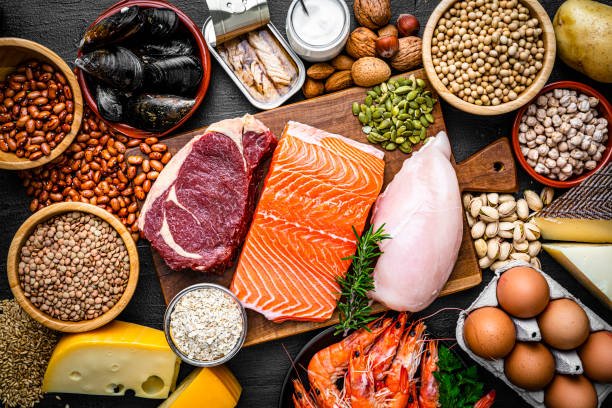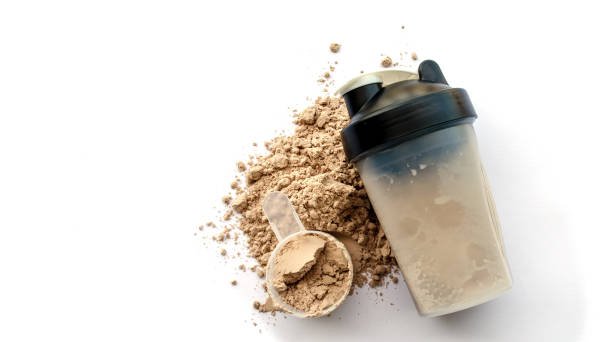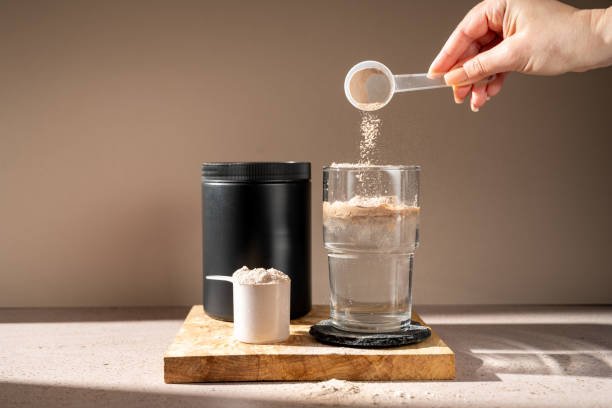Written by: Segun Akomolafe
In a world obsessed with optimal nutrition and fitness, protein supplements have transformed from niche bodybuilding products into mainstream nutrition staples. Whether you’re an elite athlete, weekend warrior, or simply looking to maintain muscle mass as you age, the complete guide to protein supplements is essential for making informed choices about your nutrition.
This guide will walk you through the complete guide to protein supplements—from how they work and who needs them to the different types available and how to incorporate them effectively into your diet.
Why Protein Matters
Before diving into supplements, let’s understand why protein deserves its reputation as a nutritional powerhouse. Your body uses protein to build and repair tissues, produce enzymes and hormones, and support immune function. For active individuals, protein plays a crucial role in muscle recovery and growth following exercise.
Each time you work out, especially during resistance training, you create microscopic tears in your muscle fibers. Your body repairs these tears during recovery, making the muscles stronger and larger—but only with adequate protein available. Without sufficient protein, your body struggles to repair and build muscle effectively, potentially limiting your progress and increasing recovery time.

Do You Actually Need Protein Supplements?
Despite what marketing campaigns might suggest, not everyone needs protein supplements. Many people can meet their protein requirements through whole food sources alone. However, supplements offer convenience and efficiency that whole foods sometimes can’t match.
You might benefit from protein supplements if:
- You struggle to meet your protein needs through diet alone
- You’re highly active with intense training schedules
- You’re vegetarian or vegan and find it challenging to consume enough plant-based proteins
- You’re recovering from an injury or surgery
- You’re experiencing age-related muscle loss
- You have a busy lifestyle that makes preparing protein-rich meals difficult
Remember that supplements should complement a nutritious diet—not replace it. Even the highest quality protein powder can’t provide the full spectrum of nutrients found in whole foods.
The Science of Protein: Understanding Your Needs
Protein requirements vary considerably based on several factors, including activity level, age, goals, and overall health. While the Recommended Dietary Allowance (RDA) suggests 0.8 grams of protein per kilogram of body weight for the average adult, this represents the minimum amount needed to prevent deficiency—not the optimal amount for physical performance or muscle maintenance.
Current research indicates that active individuals typically benefit from higher protein intakes:
- For general fitness enthusiast: 1.2-1.4g per kg of body weight daily
- For endurance athletes: 1.2-1.6g per kg daily
- For strength and power athletes: 1.6-2.2g per kg daily
- For those in caloric deficit (weight loss): 1.8-2.7g per kg daily
For a 75kg (165lb) moderately active person, this translates to approximately 90-105g of protein daily—an amount that becomes challenging to consume through food alone for many people, especially those with dietary restrictions or busy schedules.
Importantly, your body utilizes protein most effectively when distributed throughout the day rather than consumed primarily in one meal. This distribution strategy maximizes muscle protein synthesis and supports recovery, which is where supplements can play a valuable role in your nutrition strategy. That’s another reason why the complete guide to protein supplements is important.
Decoding Protein Supplement Types
The protein supplement market offers numerous options, each with distinct advantages. Understanding these differences will help you select the product that best aligns with your specific needs.
Whey Protein
Derived from milk during cheese production, whey protein is among the most popular and well-researched protein supplements available. It digests rapidly, delivers all essential amino acids, and contains high levels of leucine—a branched-chain amino acid (BCAA) particularly important for stimulating muscle protein synthesis.

Whey Comes In Three Main Forms:
Whey Concentrate (WPC): Contains 70-80% protein with more lactose, fat, and bioactive compounds. It’s typically less processed, more affordable, and offers additional nutritional benefits, but may cause digestive issues for those sensitive to lactose.
Whey Isolate (WPI): Contains 90%+ protein with minimal lactose and fat. This more processed form costs more but digests more easily and may be suitable for those with mild lactose intolerance.
Whey Hydrolysate: Pre-digested protein that absorbs even faster than isolate. While expensive, it may be beneficial for immediate post-workout nutrition or for those with significant digestive sensitivities.
Casein Protein
The other major milk protein, casein digests slowly—forming a gel in your stomach that provides a gradual amino acid release over several hours. This makes it particularly useful before bed or during extended periods without food. Casein may help reduce muscle breakdown during fasting periods and supports sustained muscle protein synthesis.
Research suggests combining fast-acting whey with slow-digesting casein may provide superior results for muscle growth compared to either protein alone, especially when consumed post-workout.
Plant-Based Proteins
Plant proteins have evolved significantly in recent years, now offering viable alternatives for those avoiding animal products. Common sources include:
Pea Protein: Complete protein with an excellent amino acid profile similar to whey, though slightly lower in methionine and higher in arginine. Research shows it can be as effective as whey for building muscle when consumed in equivalent amounts.
Rice Protein: Contains all essential amino acids but is lower in lysine. When consumed in higher amounts, it produces similar muscle-building results to whey.
Hemp Protein: Provides a moderate protein content (typically 50-70%) with beneficial fatty acids and fiber, though its complete amino acid profile is less optimal for muscle growth than other options.
Soy Protein: Complete protein with all essential amino acids. Despite concerns about its phytoestrogen content, research shows it effectively supports muscle growth without hormonal effects in most individuals when consumed in normal amounts.
Many plant-based supplements now blend multiple protein sources to create more complete amino acid profiles that rival animal-based options.
Protein Blends
These products combine different protein types to leverage their complementary digestion rates and amino acid profiles. Typical blends might include whey, casein, and egg proteins, or various plant proteins in vegan formulations.
These combinations provide both immediate and sustained amino acid release, potentially offering advantages for recovery and muscle maintenance.
Beyond The Basics: Specialized Protein Products
The protein supplement market continues to evolve with specialized products designed for specific needs:
Collagen Peptides: While not ideal for muscle building due to an incomplete amino acid profile, collagen supplements support joint health, skin elasticity, and connective tissue strength—making them a valuable addition for many active individuals, especially as they age.
Beef Protein Isolate: Derived from beef, these supplements provide complete protein without dairy components. They’re suitable for those avoiding dairy but wanting animal-derived protein.
Egg White Protein: A high-quality, complete protein source with excellent digestibility and bioavailability. It’s dairy-free but not vegan, positioning it as an alternative for those with specific dietary requirements.
Mass Gainers: These protein supplements contain additional carbohydrates and fats to increase overall calorie content, helping those struggling to consume enough calories to support muscle growth.
The Complete Guide to Protein Supplements: Navigating Protein Quality Metrics
Not all proteins are created equal. Several scientific measures help evaluate protein quality:
Biological Value (BV): Measures how efficiently your body utilizes protein after digestion, with higher values indicating better utilization. Whole eggs score near 100, establishing the reference standard.
Protein Digestibility Corrected Amino Acid Score (PDCAAS): Evaluates protein quality based on amino acid requirements and digestibility. A score of 1.0 represents optimal quality, achieved by whey, casein, egg, and soy proteins.
Digestible Indispensable Amino Acid Score (DIAAS): A newer, more accurate measurement accounting for digestibility of individual amino acids rather than the whole protein. Animal proteins typically score higher than plant proteins under this system.
Leucine Content: Beyond these formal metrics, leucine content deserves special attention. Research shows that approximately 2-3g of leucine is needed to maximally stimulate muscle protein synthesis.
Whey protein naturally contains high leucine levels (about 2.5g per 25g serving), while plant proteins generally contain less, requiring larger serving sizes to achieve the same effect.
The Complete Guide to Protein Supplements: Proper Timing

Timing your protein intake can significantly impact its effectiveness. Here are strategic approaches to consider:
Morning: A protein-rich breakfast helps stabilize blood sugar, reduce hunger throughout the day, and provide amino acids after overnight fasting. A shake with whey or plant protein can be particularly valuable for those with limited morning appetite.
Pre-Workout: Research suggests consuming protein 1-2 hours before training ensures amino acid availability during your workout, potentially reducing muscle breakdown. A shake with easily digestible protein like whey isolate works well here.
Post-Workout: While the “anabolic window” isn’t as narrow as once thought, consuming protein within 1-2 hours after training helps maximize recovery and adaptation. Either fast-acting whey or a protein blend works well in this timeframe.
Before Bed: Slow-digesting proteins like casein provide sustained amino acid release during sleep, potentially enhancing overnight recovery and reducing muscle breakdown. Research shows this strategy may be particularly beneficial for muscle maintenance and growth.
Between Meals: Protein shakes serve as excellent snacks between larger meals, helping maintain consistent amino acid levels throughout the day while controlling hunger. Either whey or blended proteins work well for this purpose.
Reading Labels: What to Look For (And What to Avoid)
The supplement industry remains largely self-regulated, making it essential to choose products carefully. When evaluating protein supplements, consider these factors:
Protein Content Per Serving
Check how many grams of protein you’re actually getting per scoop. Some products use larger scoops to create the impression of higher protein content, but much of the weight comes from additives, flavorings, and fillers.
Amino Acid Profile
Better supplements provide a detailed amino acid breakdown, allowing you to verify leucine content and overall amino acid quality.
The Complete Guide to Protein Supplements; Third-Party Testing
Look for products certified by organizations like NSF International, Informed Choice, or USP, which verify product purity, potency, and label accuracy.
Additives and Artificial Ingredients
Many supplements contain artificial sweeteners, colors, and preservatives. While these ingredients are generally recognized as safe, some individuals prefer cleaner formulations with minimal additives.
Added Digestive Enzymes
Some products include enzymes like protease, lactase, or bromelain to enhance protein digestion and reduce potential digestive discomfort.
Sugar Content
Many protein powders contain added sugars or sugar alcohols. Check the nutritional information if you’re watching your sugar intake.
Common Misconceptions About Protein Supplements
Several myths persist about protein supplements despite scientific evidence to the contrary:
Protein supplements damage your kidneys
Research consistently shows that increased protein intake doesn’t harm kidney function in healthy individuals. Those with existing kidney disease, however, should consult healthcare providers about protein intake.
You need protein immediately after working out
While post-workout protein is beneficial, the anabolic window extends several hours after training. Total daily protein intake matters more than precise timing for most people.
Women shouldn’t use protein powders designed for men
Protein requirements are based on body weight and activity level, not gender. The same protein supplements work effectively for both men and women.
Plant proteins are inferior to animal proteins
While some plant proteins have lower digestibility or incomplete amino acid profiles individually, properly formulated plant protein blends or higher serving sizes can match animal protein effectiveness.
When to Use Protein Supplements (And When Not To)
Protein supplements offer significant convenience but aren’t always necessary. Consider these guidelines:
Use supplements when:
- You’re struggling to meet protein targets through food alone
- You need portable nutrition on busy days
- You’re recovering from intense training and need additional protein
- You have increased protein needs due to injury, illness, or age-related muscle loss
Rely on whole foods when:
- You can comfortably meet your protein needs through your diet
- You’re focused on nutrient density and variety
- You’re not engaging in activities that significantly increase protein requirements
- You’re trying to maximize dietary fiber and micronutrient intake
The most effective approach for most people combines high-quality whole food protein sources with strategic supplement use when needed. This balanced strategy ensures optimal nutrition while providing the convenience and targeted delivery that supplements offer.
By understanding the science behind the complete guide to protein supplements, evaluating your individual needs, and making informed choices about product selection and timing, you can effectively incorporate these powerful tools into your nutritional strategy—helping you reach your performance, recovery, and body composition goals more efficiently.
Remember that even the best supplements complement rather than replace a foundation of nutritious whole foods, adequate hydration, proper recovery, and consistent training. Within this broader context, protein supplements can serve as valuable tools on your journey toward optimal health and performance.
